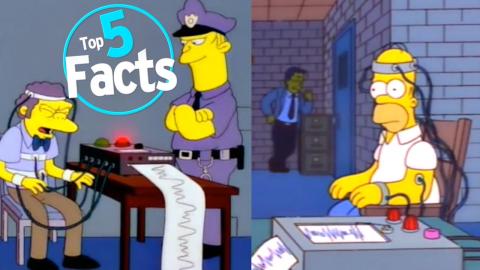Top 5 True Lie Detector Facts

In movies & TV, polygraphs are the ultimate way to get to the truth. But in reality, that may not be the case. In today's instalment of Top 5 Facts, we're separating facts from fibs and counting down the 5 most interesting facts about lie detectors.
False Confessions!
National Defence!
Clenched Buttcheeks!
All this and a free elephant for everyone who watches!*
*This response triggered greater-than-normal physiological indicators, signalling a probable lie.
#5: Lie Detectors Can Help Create Lies
In most jurisdictions, polygraph test results are not admissible as evidence in criminal court. Nevertheless, police will sometimes use a polygraph to extract a confession from suspects, or coerce an innocent suspect into making a false confession. That’s exactly what happened to Jeff Deskovic. As a teenager, police interrogated and tested him for over six hours before he made his alleged confession. He was convicted largely on the back of this evidence, despite DNA evidence suggesting it wasn’t him. He spent 16 years in prison for murder until his conviction was overturned. Lawsuits against the officials involved eventually awarded him over $54 million.
#4: Polygraphs Are Part of National Defense
In the US, the Employee Polygraph Protection Acts protects most employees from indiscriminate use of lie detector tests administered by their employers. There are exceptions though, including jobs involving national security. The Department of Defense administers thousands of tests to its employees and prospective employees every year. In 2011, for instance, the DoD performed over 43,000 tests that yielded over 3,900 admissions of misconduct. However, critics say that the tests are a poor substitute for proper investigative background checks, and point to an accuracy rate that is sometimes estimated at as low as 60%.
#3: With Practice, You Can Beat a Polygraph Test
Ok, here’s how you do it, according to Antipolygraph.org, a website devoted to exposing the junk science behind polygraphs. First, obviously, make no damaging admissions. Second, you must produce a greater physiological response when answering the control questions than when answering the relevant questions. Control questions are questions on which the examiner either expects you to lie or tricks you into lying. If your physiological response to the control questions is greater than your response to the relevant questions, you pass the test. You can influence these responses by controlling your breathing, or by hurting yourself during the control questions.
#2: Questioning Techniques Are More Effective Than Polygraphs
As I mentioned before, polygraph tests, depending on who you ask and who is conducting them, are between 60% and 90% accurate. On the other hand, certain active questioning techniques, like the Reid Technique, score very close to perfect in experiments measuring their effectiveness. Granted, the Reid Technique, a nine-step interrogation method that uses confrontation and manipulation, has been criticized for producing false confessions in actual police work– just like polygraphs.
#1: Better Lie Detection Technology is on the Way
A number of other technologies have been or are being developed that promise to make polygraphs obsolete, including computerized voice stress analysis and handwriting analysis. Scientists at the University of California, Berkeley are refining a new type of brain imaging that is over 100 more powerful than MRI, and lie detection will likely be one of its first applications. Bioethicists are already speculating that ultra-high resolution brain imaging tools could jeopardize the mental privacy of those accused of wrongdoing. In a military context though, tools like this could put an end to the use of so called “enhanced interrogation techniques.”
So, what do you think? How much faith should we put in lie detectors? For more cross-your-heart Top 10s and hope-to-die Top 5s, be sure to subscribe to WatchMojo.com.
